Across the countries surveyed, many adults say there definitely or probably is life after death. People are generally less likely to say that the spirits of ancestors can help or hurt them. And a relatively small percentage of adults in most countries believe in reincarnation.
Beliefs on these aspects of life after death vary across regions:
- Adults in Latin America and sub-Saharan Africa are among the most likely to say there is life after death. They are also, in many cases, more likely than people surveyed elsewhere around the globe to believe in reincarnation and to believe that ancestral spirits can influence their lives.
- Europeans are consistently among the least likely to hold these beliefs.
Views on the afterlife also vary by religion:
- Most Christians believe there is life after death. And, in many countries, Christians are more likely than religiously unaffiliated people to say the spirits of ancestors can help or harm them.
- Large shares of Muslims believe in life after death, but in several countries, Muslims are less likely than people in other religious communities to believe in reincarnation or in the influence of ancestral spirits.
- Buddhists and Hindus are consistently more likely than other religious groups in their countries to believe in reincarnation.
Women are somewhat more likely than men to believe in these three concepts, a gender divide that is most pronounced in European countries.
Jump to more on beliefs in: Life after death | Ancestral spirits | Reincarnation
Belief in life after death
In nearly every country surveyed, half or more of adults say there is definitely or probably life after death. This ranges from 85% of Indonesians to 38% of Swedes.
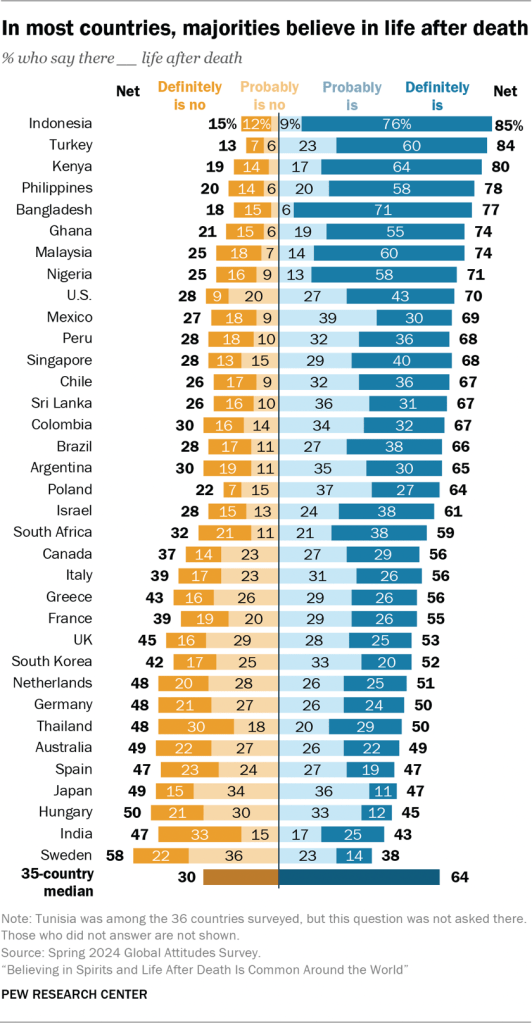
(The survey did not define “life after death” for respondents.)
Large majorities in several sub-Saharan African countries say there is life after death. In all six Latin American countries surveyed, roughly two-thirds of adults hold this view.
In most European countries surveyed, smaller shares express a belief in life after death, including just under half of adults in both Spain and Hungary.
In the Asia-Pacific region, responses on this topic vary more widely. While Indians and Japanese are among the least likely to say there is life after death, about three-quarters of Filipinos and Bangladeshis say this.
In the United States, 70% of adults say there is life after death.
Views by religion
Large shares of Muslims across the world say there is definitely or probably life after death. This is the case in all countries that have sufficiently large samples of Muslims to analyze – except in India, where only 42% of Muslims believe in life after death.
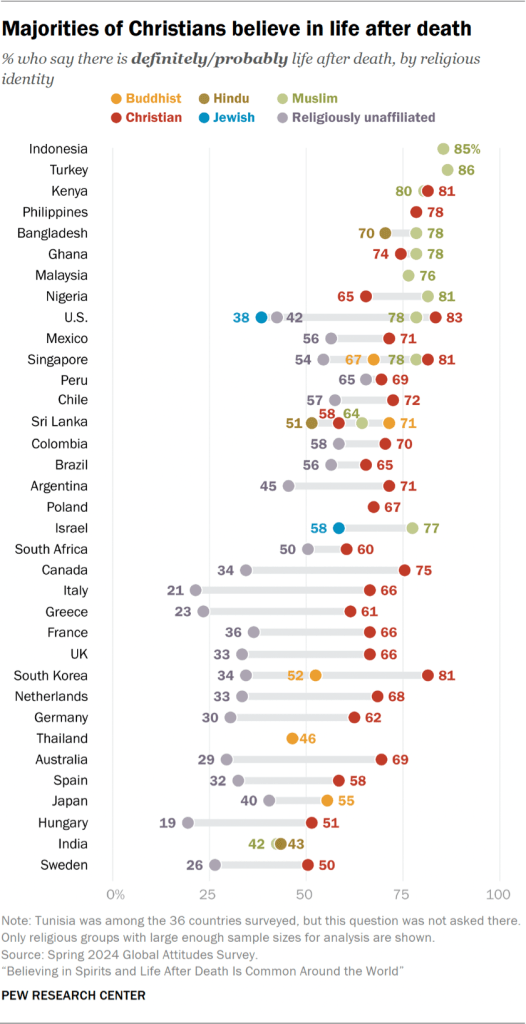
In nearly all the countries with enough Christians to analyze, around six-in-ten or more say there is life after death, including 78% of Filipino Christians and 81% of Kenyan Christians who say this.
Buddhists’ views on life after death vary, with about half of Buddhists in Thailand and South Korea saying there is life after death, compared with two-thirds or more in Singapore and Sri Lanka.
Religiously unaffiliated people typically are less likely than other adults to believe in life after death, though levels of belief vary greatly by region. Around one-third or fewer of unaffiliated adults in Europe say there is life after death, but in Latin America, Singapore and South Africa, half or more of unaffiliated adults believe in an afterlife. Indeed, nearly two-thirds of the unaffiliated in Peru say there is definitely or probably life after death.
In the U.S., 42% of religiously unaffiliated adults say they believe in life after death.
Views by rate of prayer
In most countries surveyed, people who pray at least daily are more likely than those who pray less often to say there is life after death.
For example, 69% of Japanese who pray daily say there is definitely or probably life after death, compared with 41% of other Japanese who take this position. And in Spain, 79% of adults who pray daily say there is life after death, while 38% of Spanish adults who pray less often say this.
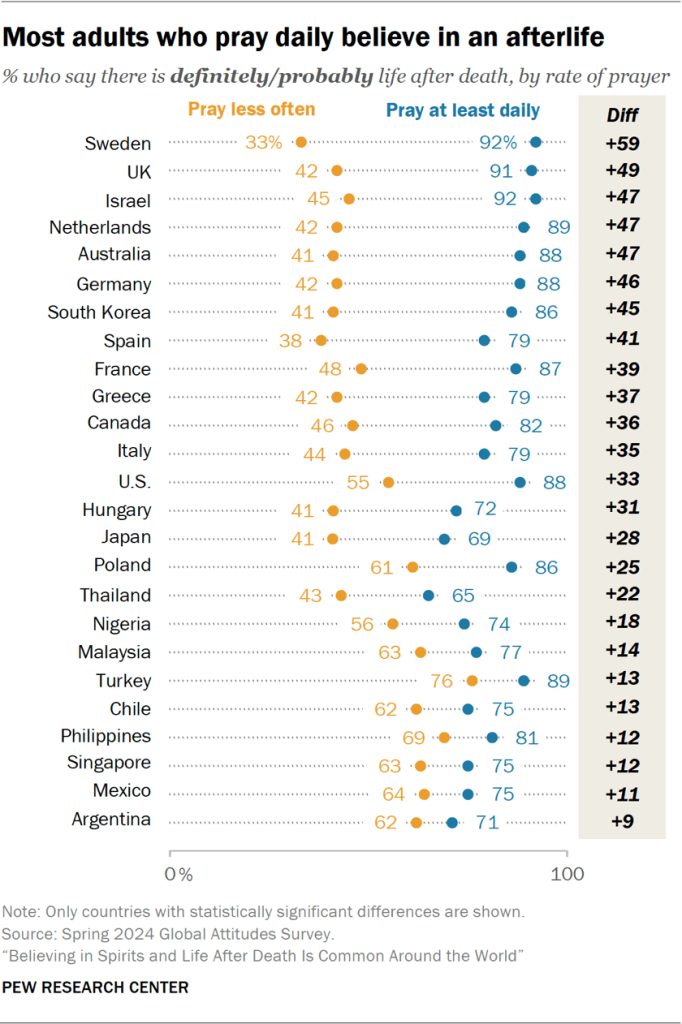
Views by education
Belief in life after death does not consistently align with education levels.
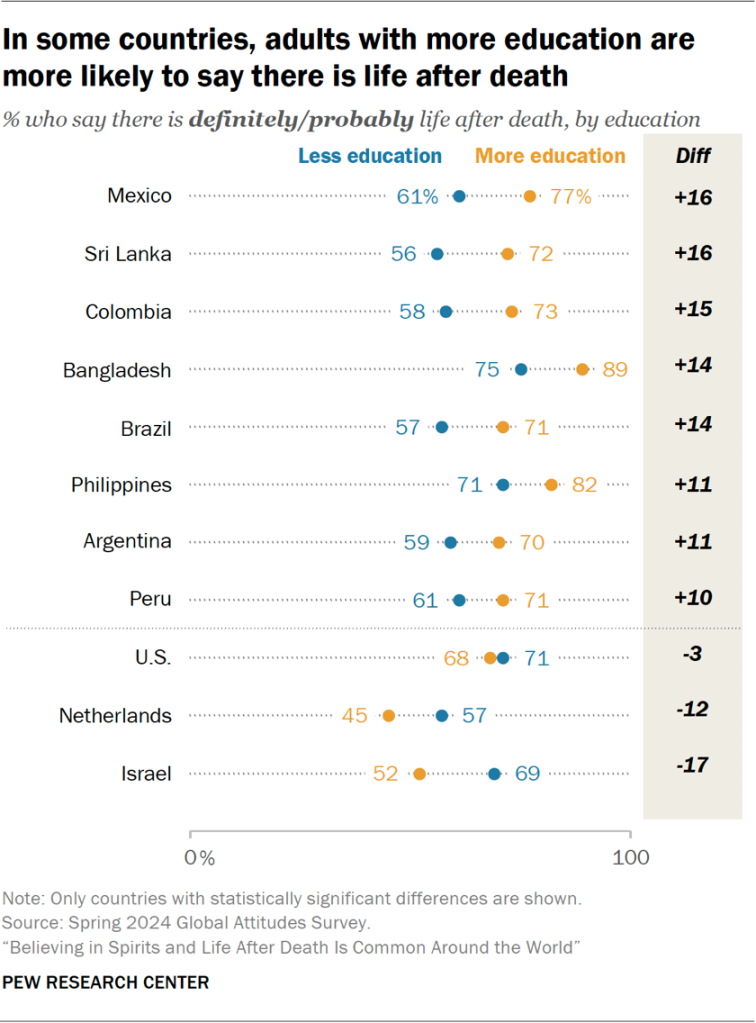
In some of the 35 surveyed countries, people with higher levels of education are more likely than other adults to say there is life after death. This is true in eight countries and is most common in Latin America.
In Colombia, for example, 73% of adults who have completed a secondary education say there is definitely or probably life after death. Among Colombian adults with less education, 58% express that view.
On the other hand, in the U.S., the Netherlands and Israel, adults with more education are less likely to say there is life after death.
In the remaining countries, there is no clear association between education levels and belief in life after death.
Views by age
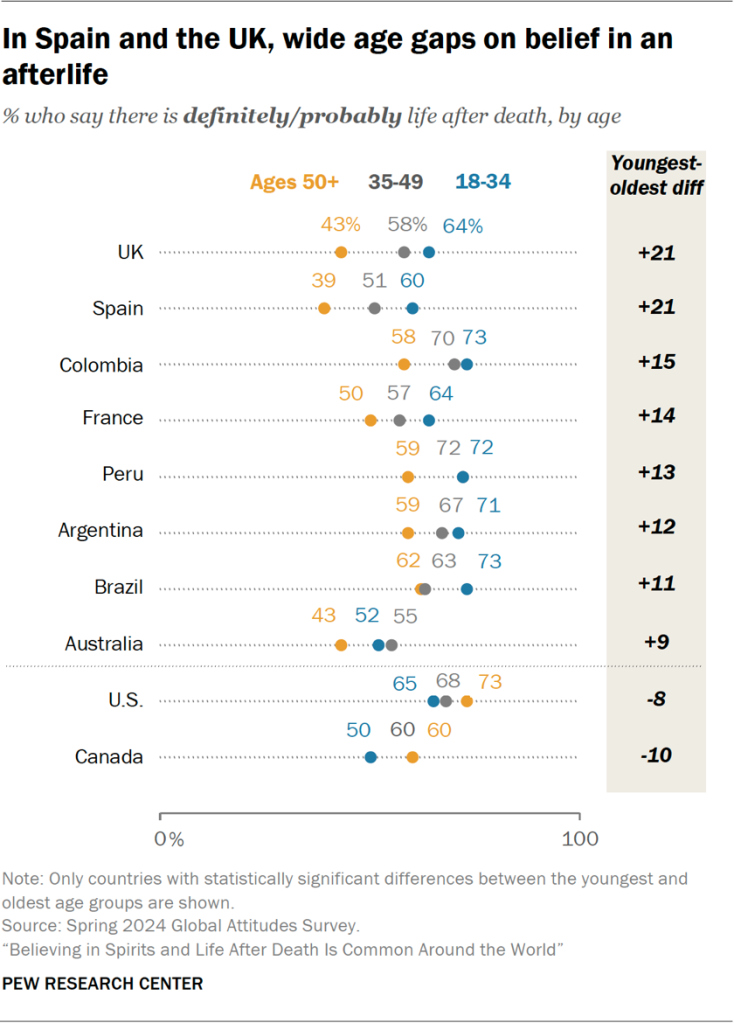
In a handful of countries, adults under 35 are more likely than those ages 50 and older to say there is life after death. For example, in the United Kingdom, 64% of younger adults believe there is definitely or probably life after death, compared with 43% of older adults who believe this.
Only in Canada and the U.S. is the opposite true. Older Canadians are more likely than the youngest adults to say there is life after death (60% vs. 50%). And older Americans are slightly more likely than younger Americans to say the same (73% vs. 65%).
Can the spirits of ancestors help or hurt people?
In most countries surveyed, fewer than half of adults believe that the spirits of ancestors can help or harm them, with a median of 38% across 35 countries expressing this view.
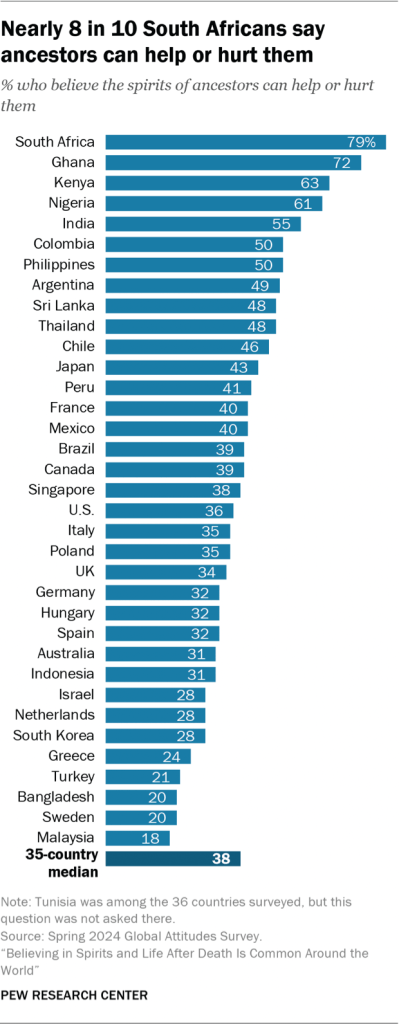
Belief in the power of ancestral spirits is most common in the four African countries surveyed, particularly in South Africa (79%) and Ghana (72%).
Across the Asia-Pacific region, smaller shares of adults believe that ancestral spirits can help or harm them. In Bangladesh and Malaysia, only about two-in-ten adults say this. But 55% of Indians and 50% of Filipinos believe that such familial spirits can impact their lives.
In European countries, fewer than half of adults believe they can be helped or harmed by ancestral spirits, ranging from 40% in France to 20% in Sweden who say this.
Adults in Latin America are generally more likely than Europeans to believe that their ancestors’ spirits can affect their lives, including 50% of Colombians who express this view.
In the U.S., 36% of Americans say they believe the spirits of ancestors can help or harm them. In a previous Center survey, 34% of Americans said that in the past 12 months they had felt the presence of a family member who is dead.
Views by religion
Muslims are among the least likely to say that the spirits of ancestors can help or harm them. For example, just 17% of Muslims in Bangladesh believe this, compared with 47% of Bangladeshi Hindus. And in Israel, 17% of Muslims believe that the spirts of ancestors can influence their lives, compared with 31% of Jewish Israelis.
Likewise, adults who are religiously unaffiliated are generally less likely to believe that the spirits of ancestors can help or harm them. In Italy, for example, Christians are about twice as likely as the unaffiliated to say the spirits of ancestors can influence their lives (41% vs. 19%).
However, in Singapore, the religiously unaffiliated are more likely than Christians to believe the spirits of ancestors can help or harm them (38% vs. 25%).
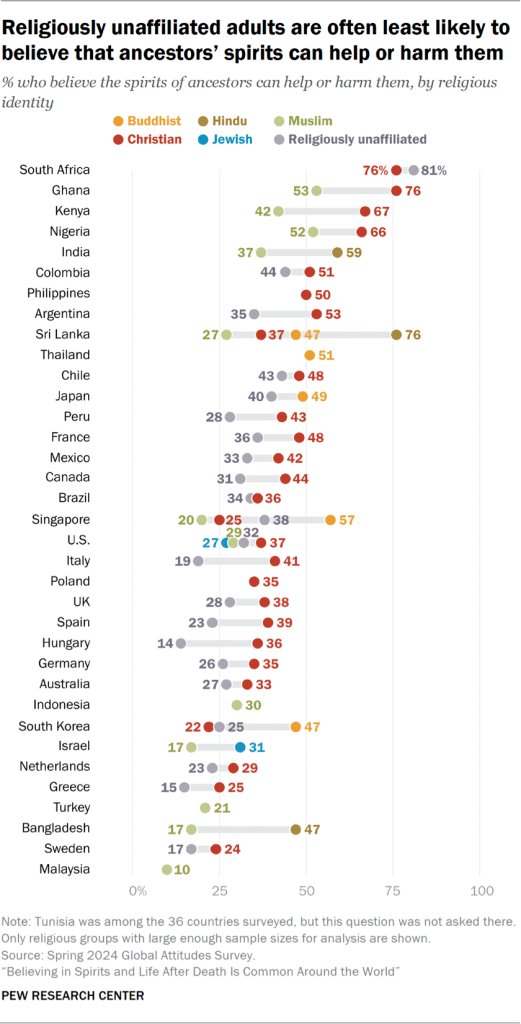
Views by gender
In several countries, women are more likely than men to believe that the spirits of ancestors can help or harm them. In Japan, for instance, 52% of women believe this, compared with 34% of Japanese men.
The gender gap emerges most consistently in European countries. For example, 42% of Polish women say ancestral spirits can influence them, compared with 27% of Polish men.
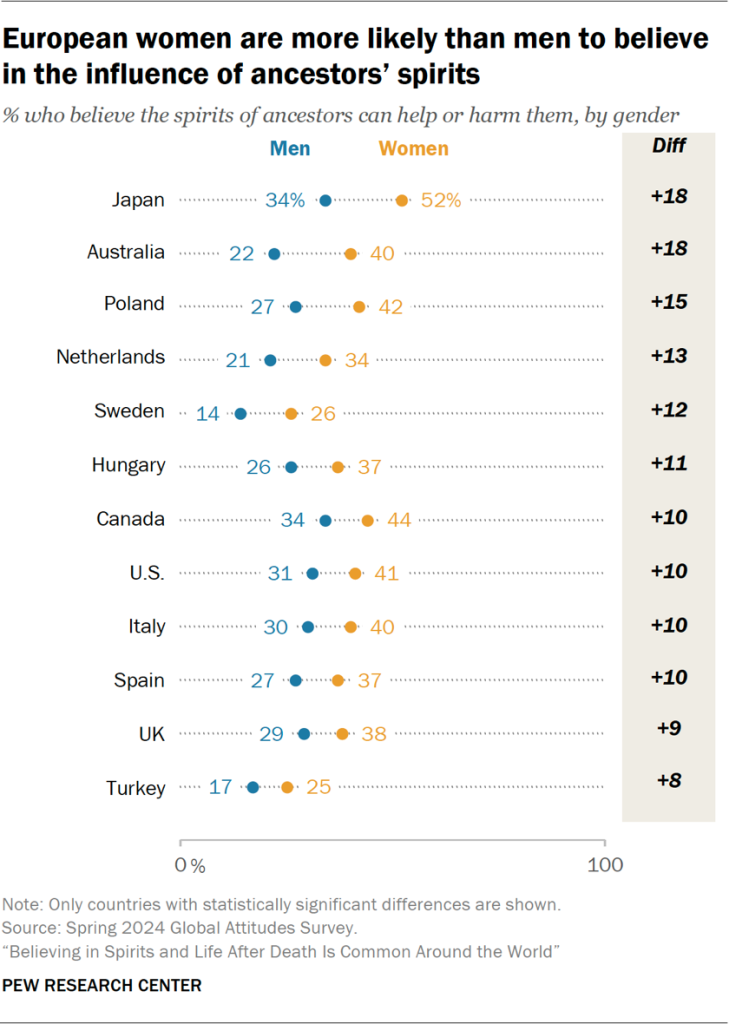
Belief in reincarnation
A median of 33% of adults across the 35 countries surveyed believe in reincarnation, defined in the survey as the belief “that people will be reborn in this world again and again.” Adults in sub-Saharan Africa, parts of the Asia-Pacific region and Latin America are especially likely to believe in reincarnation.
For example, in India, Nigeria and Thailand, 48% of adults say they believe in reincarnation. In Chile, 44% do.
Fewer people in European countries say they believe in reincarnation, including 12% in both Poland and Sweden.
Likewise, no more than two-in-ten adults in Bangladesh, Indonesia, Malaysia and Turkey believe in reincarnation.
On this question, the U.S. is roughly in the middle of the countries surveyed, with 31% of Americans saying they believe in reincarnation.
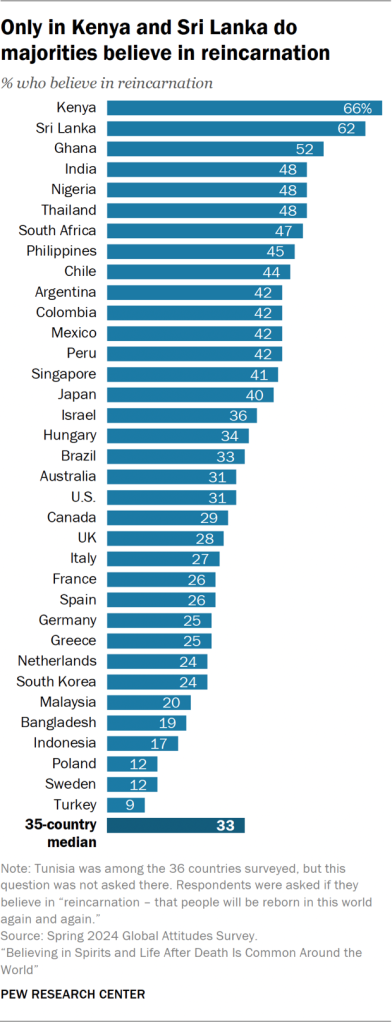
Views by religion
Reincarnation is a mainstream teaching in Buddhism and Hinduism. In places with enough Buddhists or Hindus to analyze, they are consistently more likely than other religious groups to believe in reincarnation.
Meanwhile, Muslims tend to be among the religious groups that are least likely to say they believe in reincarnation.
For example, in Sri Lanka, 70% of Buddhists and 63% of Hindus believe in reincarnation, compared with 47% of Christians and 17% of Muslims. And in India, about half of Hindus believe in reincarnation, compared with 21% of Muslims.
More than half of Christians in Kenya, Nigeria and Ghana say they believe in reincarnation. Elsewhere, smaller shares of Christians hold this belief, including just 10% of Christians in Sweden and 27% in Brazil.
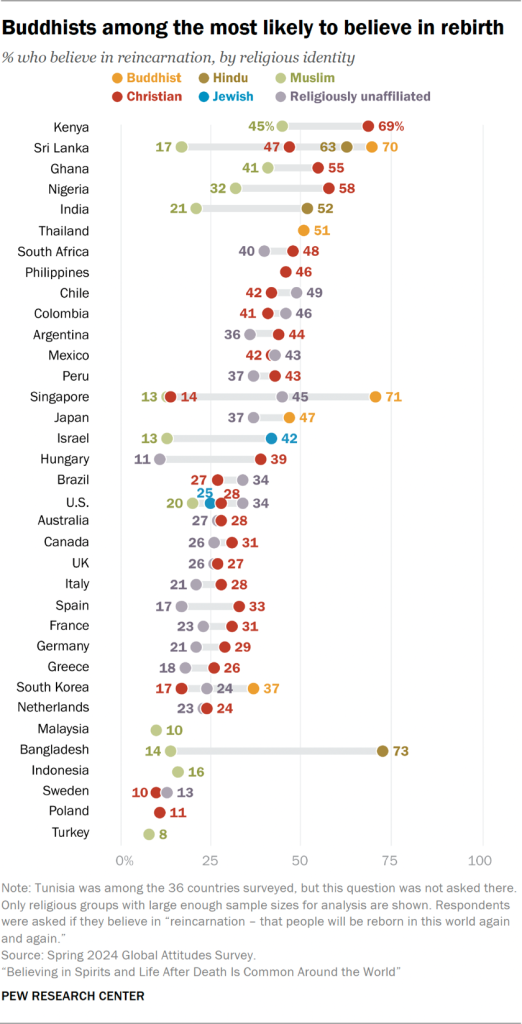
Views by age
The youngest adults in 10 countries analyzed are more likely than adults ages 50 and older to believe in reincarnation.
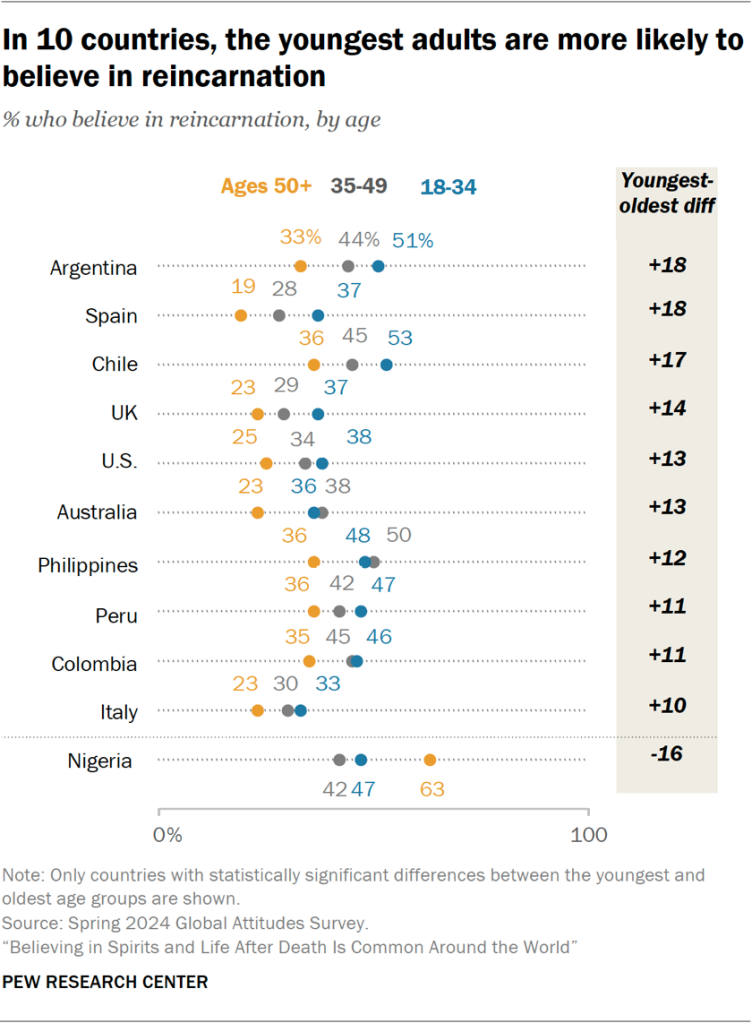
For instance, in Argentina, about half of adults under 35 express a belief in reincarnation, while one-third of adults ages 50 and older say the same.
In Nigeria, the pattern is reversed. Older Nigerians are more likely than their youngest compatriots to believe in reincarnation (63% vs. 47%).




